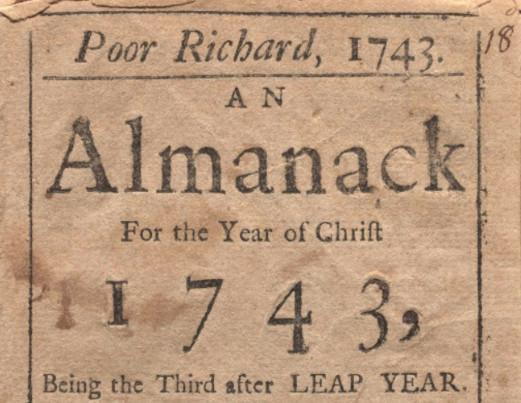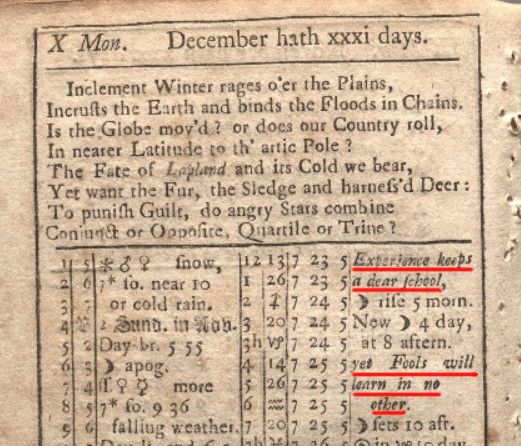Benjamin Franklin? Anonymous?

Question for Quote Investigator: Some people are only able to learn via direct experience. They disregard the lessons and the struggles of others. Yet, this experiential approach can be quite costly. The fees incurred may be measured in time expended, energy drained, money squandered, and injuries suffered.
The statesman Benjamin Franklin said something like: the school of experience is very expensive. Would you please help me to find a citation?
Reply from Quote Investigator: Benjamin Franklin published a popular series of books called “Poor Richard’s Almanack”, and the adage under examination appeared in the almanac for 1743 on the page dedicated to December. The words below have been underlined in red within a scan of the page. The adjective “dear” means high-priced, costly, or expensive in the context below:1
Experience keeps a dear school,
yet Fools will learn in no other.

Below are additional selected citations in chronological order.
In 1771 “Drewry’s Derby Mercury” of Derbyshire, England printed an extended version of the adage. Boldface added to excerpts by QI:2
But, to conclude, “Experience keeps a dear School, but Fools will learn in no other, and scarce in that; for, it is true, we may give Advice, but we cannot give Conduct,” as poor Richard says: However, remember this, “that if you will not hear Reason, she will surely rap your Knuckles.”
In 1828 Thomas Carlyle published an essay titled “Goethe’s Helena” in “The Foreign Review”, and he employed a thematically similar statement, but he disclaimed authorship by placing it between quotation marks:3
Experience, indeed, will teach him, for ‘Experience is the best of schoolmasters; only the school-fees are heavy.’
In 1843 a variant statement appeared in “The Bradford Observer” of Bradford, England:4
After all, dear bought experience is the only effectual schoolmaster.
In 1942 the adage was included in H. L. Mencken’s compilation titled “A New Dictionary of Quotations on Historical Principles from Ancient and Modern Sources”:5
Experience keeps a dear school, yet fools will learn in no other.
BENJAMIN FRANKLIN: Poor Richard’s Almanac, 1743
In 1985 “Money Talks: The 2500 Greatest Business Quotes” printed an instance using “but” instead of “yet”:6
Experience keeps a dear school, but fools will learn in no other.
Benjamin Franklin
Poor Richard’s Almanack, 1743
In conclusion, Benjamin Franklin placed the adage into the 1743 edition of “Poor Richard’s Almanack”. Franklin sometimes lifted sayings from previous compilations of quotations and proverbs; however, QI has not yet found an earlier match. Hence, Franklin deserves credit for popularizing the expression, and he may have crafted it.
Image Notes: Partial scan showing the title on the cover of the 1743 edition of “Poor Richard’s Almanack” published by Benjamin Franklin.
Acknowledgement: Great thanks to the anonymous person who inquired about a quotation attributed to Minna Antrim. While researching that quotation QI was led back in time to the adage printed by Benjamin Franklin and to many other thematically similar remarks. A separate future article will discuss the Antrim remark.
Update History: On March 23, 2025 the format of the bibliographical notes was updated.
- 1743, Poor Richard: An Almanack For the Year of Christ 1743, Being the Third after LEAP YEAR, Benjamin Franklin, Month: December, Philadelphia, Pennsylvania. (Source: University of Pennsylvania Library; accessed at rarebookroom.org on May 25, 2021) link ↩︎
- 1771 April 5, Drewry’s Derby Mercury, Response to Your Constant Reader from Richard Saunders, Quote Page 2, Column 3, Derbyshire, England. (British Newspaper Archive) ↩︎
- 1828, The Foreign Review and Continental Miscellany, Volume 1, Number 2, Goethe’s Helena (Review of Goethe’s Sämmtliche Werke), Start Page 429, Quote Page 438, Black, Young, and Young, London. (HathiTrust Full View) link ↩︎
- 1843 November 9, The Bradford Observer, Summary, Quote Page 4, Column 2, Bradford, West Yorkshire, England. (Newspapers_com) ↩︎
- 1942, A New Dictionary of Quotations on Historical Principles from Ancient and Modern Sources, Selected and Edited by H. L. Mencken (Henry Louis Mencken), Section: Experience, Quote Page 370, Alfred A. Knopf. New York. (Verified with hardcopy) ↩︎
- 1985, Money Talks: The 2500 Greatest Business Quotes from Aristotle to DeLorean, Edited by Robert W. Kent, Section: Bottom Line, Quote Page 308, Facts on File Publications, New York. (Verified on paper) ↩︎